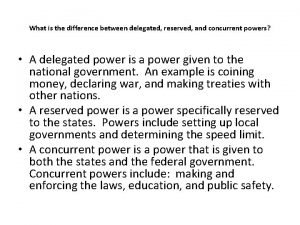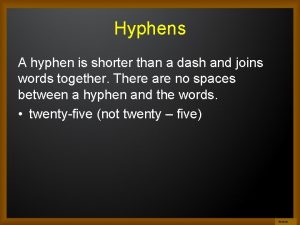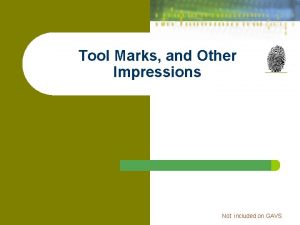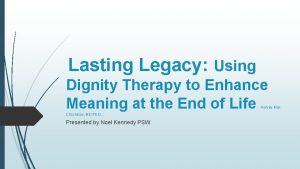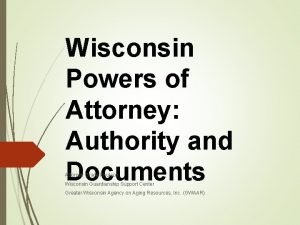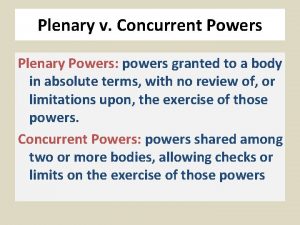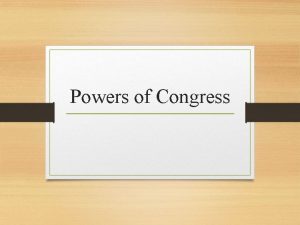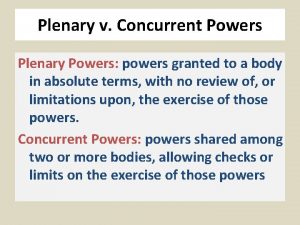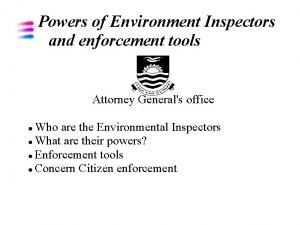Capacity The Importance of Lasting Powers of Attorney





























- Slides: 29

Capacity – The Importance of Lasting Powers of Attorney – 20 th June 2019 Jennie Kingham Senior Associate, Chartered Legal Executive Ellisons Solicitors Jennie. Kingham@ellisonssolicitors. com www. ellisonssolicitors. com

Agenda Capacity – The Importance of Lasting Powers of Attorney 1. The Mental Capacity Act 2005 2. Powers of Attorney- an overview General Powers, Enduring Powers, Lasting Powers & Advance Decisions Lasting Powers of Attorney for Business 3. Appointeeships & Deputyships What happens if you lose capacity without an EPA or LPA? Appointees The Court of Protection The Office of the Public Guardian Deputies Applying to the Court of Protection Deputy Duties & The Best Interests Principle 4. Trusts and IHT Update IHT allowances Asset Protection Trusts www. ellisonssolicitors. com

The Mental Capacity Act 2005 • Came into force on 1 st October 2007 • Five Key Principles in Part 1, Section 1 of MCA 2005 1. A person must be assumed to have capacity unless it is established that he lacks capacity 2. A person is not to be treated as unable to make a decision unless all practicable steps to help him to do so have been taken without success 3. A person is not to be treated as unable to make a decision merely because he makes an unwise decision 4. An act done, or decision made, under this Act for or on behalf of a person who lacks capacity must be done, or made, in his best interests 5. Before the act is done, or the decision is made, regard must be had to whether the purpose for which it is needed can be as effectively achieved in a way that is less restrictive of the person’s rights and freedom of action www. ellisonssolicitors. com

s 3 Mental Capacity Act 2005 - Inability to make decisions (1) For the purposes of section 2, a person is unable to make a decision for himself if he is unable— (a) to understand the information relevant to the decision, (b) to retain that information, (c) to use or weigh that information as part of the process of making the decision, or (d) to communicate his decision (whether by talking, using sign language or any other means). (2) A person is not to be regarded as unable to understand the information relevant to a decision if he is able to understand an explanation of it given to him in a way that is appropriate to his circumstances (using simple language, visual aids or any other means). (3) The fact that a person is able to retain the information relevant to a decision for a short period only does not prevent him from being regarded as able to make the decision. (4) The information relevant to a decision includes information about the reasonably foreseeable consequences of— (a) deciding one way or another, or (b) failing to make the decision. www. ellisonssolicitors. com

Powers of Attorney- an overview There are many different forms of Power of Attorney, however perhaps the most common and well known are: • S 10 General Powers of Attorney • Enduring Powers of Attorney (‘EPAs’) • Property & Affairs and Health & Welfare Lasting Powers of Attorney (‘LPAs’) www. ellisonssolicitors. com

Section 10 General Powers of Attorney • A General Power of Attorney is a document executed in accordance with the provisions of section 10 of the Powers of Attorney Act 1971. • Under a section 10 General POA you can appoint up to four Attorneys to assist you with all aspects of the administration and management of your financial affairs. A s 10 POA relates to your finances only and does not give an attorney/attorneys any authority to make decisions on your behalf in connection with your health and welfare. • Attorneys under a s 10 POA can be appointed jointly or jointly and severally to deal with the administration of the financial affairs of the donor. • Only the donor signs a s 10 POA- the attorneys are not required to sign. • A s 10 POA is limited as the document will only remain valid for as long as the donor thereof retains the requisite mental capacity to deal with the administration and management of their financial affairs. If the donor of a s 10 POA becomes mentally incapable the document fails and must no longer be used by the relevant attorney/attorneys appointed by the Power. www. ellisonssolicitors. com

Enduring Powers of Attorney- the old regime Prior to the implementation of the Mental Capacity Act 2005 on 1 st October 2007 the system of law in place to deal with the limitations of the s 10 POA (i. e. to have a POA which would endure incapacity) was the Enduring Power of Attorney (‘EPAs’), under the Enduring Powers of Attorney Act 1985. Under an EPA a donor can appoint Attorneys to deal with the management of their financial affairs. If the EPA is left unrestricted, the Attorney/Attorneys appointed can assist the donor with the administration of their finances prior to the loss of the donor’s capacity under the instruction of the donor. However, unlike the s 10 POA an EPA will endure the incapacity of the donor, so that if the donor loses capacity the attorney/attorneys named will assume full control. Attorneys under an EPA can be appointed jointly or jointly and severally. EPAs relate to finances only; the document does not give an Attorney jurisdiction in respect of the donor’s health & welfare. A key feature of an Enduring Power of Attorney is when the document needs to be registered. Registration is a process where the EPA is sent to the Office of the Public Guardian after notifying certain parties, and the document is registered on a central register. As above the timing of this is key; as an Attorney appointed under an EPA you must register this document with the OPG before you continue to use it if you believe that the donor is becoming mentally incapable of dealing with the administration and management of his/her property and affairs. Post the introduction of MCA 2005 you can no longer make new EPAs. Existing EPAs executed before 1 st October 2007 are still valid and usable. www. ellisonssolicitors. com

Lasting Powers of Attorney- the new regime • Since 1 st October 2007 we have had Lasting Powers of Attorney. There are two different forms of LPAs; Property & Affairs LPAs and Health & Welfare LPAs. • Property & Affairs LPAs replace the old form EPAs. They enable Attorneys (up to four) to act on behalf the donor in connection with the administration and management of their property and financial affairs. • If left unrestricted Property & Affairs LPAs can be used both before the incapacity of the donor under the donor’s instruction, and then after the incapacity of the donor, when the Attorney/Attorneys appointed would assume complete control of the administration of the donor’s financial affairs. • Property & Affairs LPAs are more complex documents than EPAs but they do offer more flexibility and protection for the donor: • Allows for the appointment of replacement Attorneys • The donor can impose restrictions eg. it should only take effect on mental and/or physical incapacity • The donor can include guidance to his/her Attorneys • A separate certificate of capacity must be completed • The role of the ‘notifiable persons’ • Charging provisions www. ellisonssolicitors. com 13 October 2010 8

Lasting Powers of Attorney – the new regime • Health & Welfare LPAs are something which we have never had before. They enable you to appoint Attorneys to deal with making decisions on your behalf in respect of your health and personal welfare, for example deciding where you might live, the people you have contact with or the treatment you may receive. • A Health & Welfare LPA can authorise Attorneys to make general health & welfare decisions subject to the any particular restrictions or guidance you may wish to specify. But there is also a further section which deals with giving authority to your Attorneys to give or refuse consent to life sustaining treatment on your behalf. You do not have to give your Attorneys this authority. • Unlike the Property & Affairs LPAs, Health & Welfare LPAs only take effect in the event of the donor’s incapacity to make such decisions personally. • As well as there now being a health and welfare option, one of the other main differences between LPAs and EPAs is when the documents must be registered with the Office of the Public Guardian. LPAs must be registered with the OPG before they can be used, and so when compared to EPAs registration is not dependant on the incapacity of the donor. www. ellisonssolicitors. com 13 October 2010 9

Advance Decisions • An Advance Decision is a statement allowing you to set out what medical treatment or procedures you wish to consent to or refuse, should you lose capacity to make decisions about these matters in the future. • Before the Mental Capacity Act 2005 these were known as ‘Advance Directives’ or ‘Living Wills’ and were morally, but not legally binding. Advance Decisions are legally binding. • An Advance Decision cannot force your doctor to give specific treatment, nor does it permit your doctor to end your life. However, an Advance Decision requires your doctor to respect your wishes concerning your consent to or your refusal of life sustaining treatment, even though such refusal might risk or shorten your life. • Legal Requirements: – You must be over 18 and have mental capacity – It must contain a declaration confirming what medical treatment you consent to or refuse. – It must contain a declaration that you know the Advance Decision will apply even if your life is at risk • If you had an Advance Directive before 1 st October 2007 it is recommended that you re-execute the document to confirm its legal effect. www. ellisonssolicitors. com 13 October 2010 10

Do I need a Business Lasting Power of Attorney? – If you want the same people to act as your personal and Business Attorneys, they can be appointed under a single LPA, otherwise you can have separate LPAs detailing what is covered by each one Advantages: - – Day to day pre-incapacity e. g. if out of office decisions can still be made – Managing incapacity – Bank account issues – accounts are frozen if signatory lacks capacity and no LPA is in place – Regulatory breaches – Companies Act 2006 – Promoting business survival – business can carry on without the delay of a Court of Protection application www. ellisonssolicitors. com

Who is a suitable Attorney? • A donor should think carefully before choosing someone to be their Attorney. An Attorney should be someone who is trustworthy, competent and reliable. • Think about what sort of business you have – what is your business plan, who are the other people involved in your business and how big is your business? These questions will help you decide if your choice of Attorney is likely to lead to any problems or objections • Do they have the skills and ability to carry out the necessary tasks? – Depending on your business, you may need someone with the relevant qualifications e. g. a Solicitor must appoint a Solicitor, also Doctors, Vets, Accountants etc • Are there likely to be any conflicts? – Do they own other businesses you deal with? – Do you enter into contracts with them? – Think about joint and several appointments – how will that work? – If your Attorney is your spouse and you get divorced, the LPA is revoked www. ellisonssolicitors. com

Potential Problems and Pitfalls • Drafting your Business LPA – It must be clear what the LPA covers and if you have a separate LPA for personal finances, each document must set out what is covered – Think about wording: – ‘This Lasting Power of Attorney only relates to my business affairs’ or ‘My Attorneys may only make business decisions’ – too vague – Instead, ‘The Attorney(s) appointed under this Lasting Power of Attorney are only authorized to make decisions relating to [business/company name]’ or ‘I appoint my Attorney(s) on this LPA only to make decisions regarding my business [business/company name]’ – Do you need to include wording allowing for the business to be bought out or a change of name of your business? You could include ‘and any other [subsequent] [further] [additional] companies or business to which I am a [Partner] [Director]’ www. ellisonssolicitors. com

What happens when a relative or friend loses capacity and does not have a Power of Attorney? Where an individual lacks the capacity to manage their financial affairs and their assets and income are relatively minimal, the appointment of an appointee may be the most suitable option. What is an appointee? An appointee is someone who manages the state benefits of someone who cannot manage their own affairs because they are mentally incapable or severely disabled. Only one appointee can act on behalf of someone who is entitled to benefits from the Department for Work and Pensions. Who can be an appointee? An appointee can be: • an individual • an organisation or representative of an organisation Note: An appointee is not appropriate where the person has income other than state benefits, such as a private pension arrangement or substantial income from investments, or significant capital. www. ellisonssolicitors. com

What are an appointee’s responsibilities? An appointee is responsible for making and maintaining any benefit claims. An appointee must: • sign the benefit claim form; • tell the benefit office about any changes which affects entitlement to benefits; • spend the benefit (which is paid directly to the appointee) in the person’s best interests • tell the benefit office if they stop being the appointee If the benefit is overpaid, depending on the circumstances, the appointee could be held responsible. How to become an appointee If the person is in receipt of: • • • Attendance Allowance - contact the Attendance Allowance helpline Disability Living Allowance - contact the disability benefits helpline State Pension - contact the local pension centre Personal Independence Payment (PIP) - contact the PIP new claims line all other benefits - contact Jobcentre Plus www. ellisonssolicitors. com

The Court of Protection (the COP) • Created by s 45 of the Mental Capacity Act 2005 • An individual Court with its own rules of procedure, practice directions and Judges. It also has a Panel of Deputies of Last Resort, of which Ian Reed is one of only 59 in the country • It exists to safeguard vulnerable individuals who lack mental capacity to make decisions for themselves in relation to their property and affairs, and also now in respect of health and welfare matters • Property & Affairs decisions include – Decisions for ‘P’ such as selling their property, authorising statutory Wills or gifts – Appointing Deputies – Dealing with issues arising from the administration of Enduring Powers of Attorney and Lasting Powers of Attorney • Health & Welfare decisions include – Decisions regarding residence of ‘P’ – Contact arrangements – Health decisions – Deprivation of Liberty Safeguards (‘DOLS’) • 90% of cases brought before the Court relate to property and financial affairs matters www. ellisonssolicitors. com

Office of the Public Guardian (the OPG) • Established on 1 st October 2007, replacing the Public Guardianship Office • Executive agency of the Ministry of Justice that protects the assets and supervises the financial affairs of people lacking capacity. It has the following functions: • To set up and manage a register of Lasting Powers of Attorney, Enduring Powers of Attorney and Court Orders appointing Deputies • To supervise Deputies • To instruct OPG Visitors • To receive reports from Attorneys acting under Lasting Powers of Attorneys and Deputies • To provide reports to the Court of Protection • To investigate abuse and assist with dispute resolution • The OPG differs from the COP in that the OPG does not make decisions – this is done by the COP. www. ellisonssolicitors. com

What if you do not have a Lasting Power of Attorney? Question: What if I lose capacity and I do not have a valid Enduring Power of Attorney or Lasting Power of Attorney? The Court of Protection • Whilst it is always preferable to have a Power of Attorney in place as with this comes the choice as to whom you appoint and how you appoint your chosen Attorneys, this is not always possible. Losing capacity to deal with your financial and business affairs is not always age related and we do not always have time to prepare. Remember: accidents happen. • In the event that we lose capacity to deal with our financial affairs without having a valid LPA in place, it will be necessary for a relative, friend or a professional to apply to the Court of Protection for a Court Order appointing the applicant as Property & Affairs Deputy of the incapable party. A Deputy must administer the incapable party’s finances and business in accordance with the terms of the Court Order and report annually to the Court with an account in connection with the incapable party’s affairs. • Applications to the Court of Protection can be very expensive and take at least six months to complete during which time no-one can act on your behalf which could cause considerable harm to your business • In dealing with an incapable party’s finances a Deputy must keep in mind the principles of the Mental Capacity Act 2005 at all times, in particular the ‘best interests principle’. www. ellisonssolicitors. com

Deputies A deputy is a person appointed by the Court of Protection to manage the affairs of someone who lacks the mental capacity to manage their own affairs. A deputy is usually a friend or relative of the person who lacks capacity, but in some circumstances could be a professional such as a solicitor or accountant or another professional appointed by the court. Professional deputies will charge for their time, and this is paid for from the person who has lost capacity’s estate. To become a deputy you must be at least 18 years of age and willing to be a deputy. A deputy must consent to their appointment. There are two different types of deputyship: property and affairs, and personal welfare. www. ellisonssolicitors. com

Application for a Court of Protection Deputyship Order The person who applies to be your Deputy may not have been your choice under an LPA The application will involve a lot of paperwork: COP 1 Application form COP 1 A Additional information COP 3 Capacity Assessment COP 4 Deputy Declaration COP 24 Witness Statement Your Deputy may have to go back to the Court for further authority at a later date Ongoing costs: Security Bond Administration and Supervision Fees Professional fees www. ellisonssolicitors. com

Duties of a Deputy • Practicalities – Read the Court Order!! – Open a Deputyship Account – Check ‘P’s benefits – Take investment advice (if authorised) – Maintain the Security Bond – Report annually to the OPG • Decision making – Always refer to the five key principles (Assumption of capacity, Must take all practicable steps to assist, unwise decisions, best interests & least restrictive means) and the Code of Practice – Are there Court applications that need to be made? – To sell ‘P’s property – To apply for a Statutory Will – Gifts – Health & Welfare matters – Deprivation of Liberty Safeguards www. ellisonssolicitors. com

Important points to consider Just because someone is mentally incapable of managing their financial affairs, it does not automatically mean that they cannot make other decisions themselves. For example, someone may be able to make a decision on where they should live, although they cannot manage their money. Relatives, friends and medical professionals must consider the provisions of the Mental Capacity Act when considering whether the appointment of a deputy is appropriate and during the ongoing administration of someone’s affairs. www. ellisonssolicitors. com

Best Interests The law gives a checklist of key factors which family members, friends or professionals who are acting as “decision makers” must consider when working out what is in the best interests of a person who lacks capacity. This list is not exhaustive and you should refer to the Mental Capacity Act 2005 Code of Practice for more details. • It is important not to make assumptions about someone’s best interests merely on the basis of the person’s age or appearance, condition or any aspect of their behaviour. • The decision-maker must consider all the relevant circumstances relating to the decision in question. • The decision-maker must consider whether the person is likely to regain capacity (for example, after receiving medical treatment). If so, can the decision or act wait until then? • The decision-maker must involve the person as fully as possible in the decision that is being made on their behalf. www. ellisonssolicitors. com 13 October 2010 23

Spouse Exemption and the Transferable Nil Rate Band • Whole estate passing to spouse – exempt from Inheritance Tax • Transferable Nil Rate Band – Current IHT threshold = £ 325, 000 – Surviving spouse = up to £ 650, 000 – Value of 1 st estate – Lifetime Gifts – Importance of keeping documents – Marriage certificate – IHT forms – Grant of Representation www. ellisonssolicitors. com

Inheritance Tax – Main residence nil-rate band • An additional nil-rate band will be available when a residence is passed on death to direct descendants • 2017/18 £ 100, 000 • 2018/19 £ 125, 000 • 2019/20 £ 150, 000 • 2020/21 £ 175, 000 • Transferable where the second spouse or civil partner dies after 5 April 2017 • Available where a person downsizes or ceases to own a home after 7 July 2015 and assets of an equivalent value, up to the additional nil-rate band, are passed on death to their direct descendants. This element is the subject of a technical consultation. • Questions – What is ‘main residence’? – Who are ‘direct descendants’? www. ellisonssolicitors. com - What if you have a discretionary trust?

Reduced rate of Inheritance Tax A major change to IHT, for deaths on or after 6 April 2012, is the potential reduction in the rate of IHT from 40% to 36%, where 10% or more of an individual’s estate passes to charity or a registered club. The calculation is somewhat complex though, as the Estate is divided into three component parts; the survivorship component, the settled property component and the general component. Each component must be valued separately to determine whether the criteria have been met. www. ellisonssolicitors. com 13 October 2010 26

Asset Protection Trusts • Asset Protection Trusts - Loss of control - Intentional deprivation of assets - No time limit - Costs www. ellisonssolicitors. com

Conclusions • Always be aware of capacity issues when seeing clients • Powers of Attorney are relevant to us all • Remember to consider Business LPAs • What if your client lacks capacity? Consider Appointeeship or Deputyship • Take action: what we have discussed today are legal documents/applications, thus it is always preferable to take legal advice and to instruct a suitable and qualified professional to draft the same on your behalf. By doing so you can ensure that you will get what you want. Remember it is better to have a Power of Attorney and it not be needed, than to need a Power of Attorney and not have one in place. www. ellisonssolicitors. com

Meet the Team: Ellisons, Wherstead Park, The Street, Wherstead, Ipswich, IP 9 2 BJ – 01473 556900 Jennie Kingham, Senior Associate 01473 556906 Jennie. kingham@ellisonssolicitors. com Katie Mayes, Associate 01473 556907 Katie. mayes@ellisonssolicitors. com www. ellisonssolicitors. com Catherine Frost, Associate 01473 556905 Catherine. frost@ellionssolicitors. com
 Non legislative powers of congress
Non legislative powers of congress Causes of wwi (mania)
Causes of wwi (mania) Difference between delegated concurrent and reserved powers
Difference between delegated concurrent and reserved powers What is the difference between expressed and implied powers
What is the difference between expressed and implied powers Congress informal powers
Congress informal powers Enumerated vs implied
Enumerated vs implied Was the united states on the axis powers or allied powers?
Was the united states on the axis powers or allied powers? Production units have an optimal rate of output where:
Production units have an optimal rate of output where: New deal criticisms
New deal criticisms Longest lasting empire
Longest lasting empire Latent learning
Latent learning A long lasting paper like material made from reeds
A long lasting paper like material made from reeds Lasting contributions of rome
Lasting contributions of rome Longest lasting empire
Longest lasting empire Long lasting hyphen
Long lasting hyphen 4.05 quiz: footwear and tire marks
4.05 quiz: footwear and tire marks What lasting legacies did the aksum kingdom leave
What lasting legacies did the aksum kingdom leave Short constructed response examples
Short constructed response examples Lasting legacy meaning
Lasting legacy meaning What was the legacy of the roman empire
What was the legacy of the roman empire The commandments number 1-4
The commandments number 1-4 Desired service and adequate service
Desired service and adequate service Production units have an optimal rate of output where
Production units have an optimal rate of output where đặc điểm cơ thể của người tối cổ
đặc điểm cơ thể của người tối cổ Cái miệng xinh xinh thế chỉ nói điều hay thôi
Cái miệng xinh xinh thế chỉ nói điều hay thôi Mật thư anh em như thể tay chân
Mật thư anh em như thể tay chân Bổ thể
Bổ thể Tư thế ngồi viết
Tư thế ngồi viết Thẻ vin
Thẻ vin Thơ thất ngôn tứ tuyệt đường luật
Thơ thất ngôn tứ tuyệt đường luật


